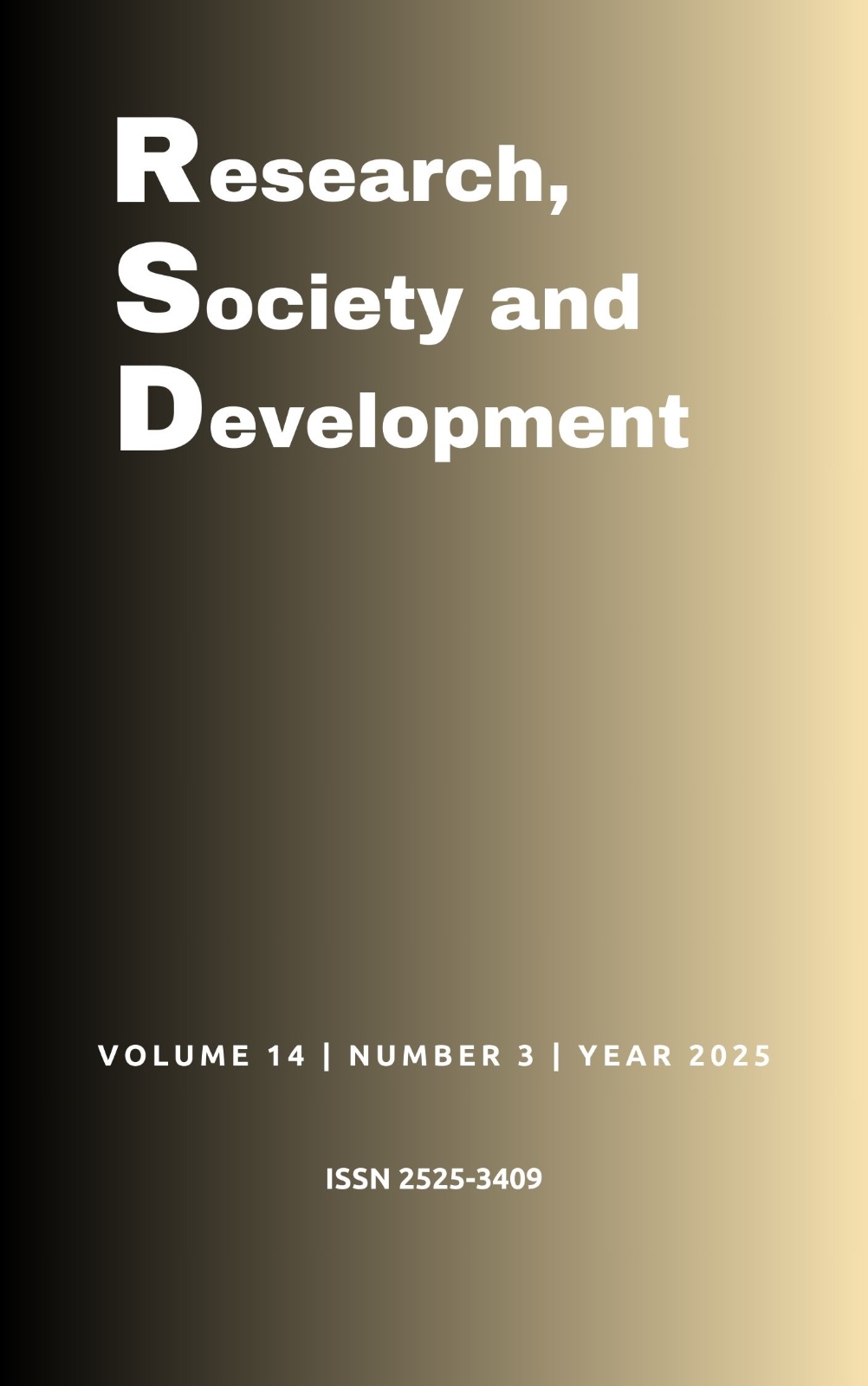Consciência corporal como possibilidade de formação humana integral nos Institutos Federais de Educação, Ciência e Tecnologia
DOI:
https://doi.org/10.33448/rsd-v14i3.48507Palavras-chave:
Formação humana integral; Consciência corporal; Institutos Federais; Educação crítica; Materialismo histórico-dialético; Ensino.Resumo
Este artigo tem como objetivo analisar a relação entre a consciência corporal e a formação humana integral nos Institutos Federais, fundamentando-se no materialismo histórico-dialético e na abordagem crítico-superadora. Para isso, foi realizada uma revisão bibliográfica com base em fontes acadêmicas dos últimos cinco anos, obtidas em bases de dados como SciELO, Elsevier e Google Scholar. O estudo demonstra que a consciência corporal desempenha um papel fundamental na constituição do sujeito histórico, pois permite que o indivíduo compreenda sua corporeidade como um elemento inseparável de sua identidade e de suas relações sociais. Além disso, a pesquisa evidencia que práticas pedagógicas interdisciplinares, como projetos integradores e metodologias ativas, contribuem significativamente para o desenvolvimento da percepção corporal dos estudantes, favorecendo sua autonomia e participação crítica na sociedade. No entanto, desafios como a redução da carga horária de disciplinas voltadas à educação física e as imposições curriculares de modelos neoliberais podem comprometer a efetivação dessa abordagem nos Institutos Federais. Conclui-se que a valorização da consciência corporal na formação humana integral é essencial para garantir um ensino que promova o desenvolvimento pleno dos estudantes, capacitando-os para atuar de maneira crítica e transformadora na sociedade.
Referências
Amorim, R., & Ferri, C. (2021). Formação Humana Integral no Ensino Médio: um estudo das legislações e orientações curriculares nacionais no Brasil, Chile e Argentina. ETD Educação Temática Digital, 23(3), 739-756.
Araújo, I. P., & Araújo Raimundo, J. P. (2025). O despertar da consciência e o reencontro com o sentido da vida: educação integral em diálogo com pressupostos freirianos e franklianos. Saberes: Revista interdisciplinar de Filosofia e Educação, 25(01), AI03-AI03.
Arcanjo, J. R. L., Adams, F. M., & de Moradillo, E. F. (2023). EF de. A educação integral e as atuais propostas curriculares: Um Olhar a Partir Da Perspectiva Histórico-Crítica. XIV Encontro Nacional de Pesquisa em Educação em Ciências–XIV ENPEC. Caldas Novas, Goiás.
Barcelos, R. G., & Moll, J. (2021). O Programa Mais Educação e seu legado: possibilidades curriculares na perspectiva da formação humana integral. Retratos da Escola, 15(33), 887-911.
Bertuani, A. L. C., & Ferreira, M. J. D. R. (2022). A educação das relações étnico-raciais como eixo integrador do ensino médio integrado: politecnia, formação humana integral, interdisciplinaridade e pedagogia antirracista. IFES.
Caron, M. (2021). Corpo, transborda: Educação somática, consciência corporal e expressividade. Summus Editorial.
Carvalho Becker, P. C., & Silva Thiesen, J. (2021). Integração como estratégia curricular indutora na formação humana integral. Retratos da Escola, 15(33), 793-812.
Costa, D. D. (2022). A Base Nacional Comum Curricular (BNCC) do ensino médio: entre os interesses neoliberais e possibilidades de formação humana. Conjecturas, 22(5), 949-964.
Costa, F. A., Maldaner, J. J., Rythowem, M., Cavalcante, R. P., de Sena, R. M. M., Victor, V. F., ... & Souza, W. A. (2022). Laboratórios on-line: Espaços do ensino remoto e possíveis contribuições para formação humana integral na educação básica. Research, Society and Development, 11(2), e43511225904-e43511225904.
Dantas, E. (2022). Os Institutos Federais como referência para formação humana integral. Revista Científica Semana Acadêmica.
Doretto, S. (2021). Educação integral: o yoga como instrumento de intervenção na formação continuada de educadoras (es). UNESP.
Ferreira, S. A. (2020). Orientação profissional: atuação na formação humana integral de alunos da EPTNM. Instituto Brasileiro de Informação em Ciência e Tecnologia (Ibict)
Flôres, M. T. D. (2024). O projeto integrador como prática pedagógica nos institutos federais e sua contribuição na formação humana integral dos estudantes. Instituto Brasileiro de Informação em Ciência e Tecnologia (Ibict)
Molina Neto, V. (2023). Menos Educação Física, menos formação humana, menos educação integral. Movimento, 29, e29001.
Pacheco, E. (2020). Desvendando os Institutos Federais: identidade e objetivos. Educação Profissional e Tecnológica em revista, 4(1), 4-22.
Sampaio, L. D., & Amorim, L. B. (2023). O Ensino Médio Integrado nos Institutos Federais de Educação, Ciência e Tecnologia e a formação humana integral. Revista Espaço Pedagógico, 30, e14341-e14341.
Silva, P. S., & Oliveira, A. P. L. R. Organização e disseminação de memórias escolares: uma reflexão sobre a contribuição das bibliotecas para a formação humana integral nos Institutos Federais. RIDPHE_R Revista Iberoamericana do Patrimônio Histórico-Educativo, 9, e023004-e023004.
Souza, H. C., Cardoso, L. M. L., & Cardoso, F. M. C. B. (2024). Institutos federais e a formação humana integral. Simpósio de Educação Profissional e Tecnológica do Sudeste, 1(1).
Viana, V. N. (2021). Percepção da educação física na formação humana, integral e omnilateral de discentes da educação profissional técnica federal na Amazônia. IFAP.
Zatti, V. (2023). Educação profissional e tecnológica: espaço-tempo de formação humana?. Educação & Sociedade, 44, e270599.
Downloads
Publicado
Como Citar
Edição
Seção
Licença
Copyright (c) 2025 Tadeu Artur Vieira Martins; Rosiney Rocha Almeida

Este trabalho está licenciado sob uma licença Creative Commons Attribution 4.0 International License.
Autores que publicam nesta revista concordam com os seguintes termos:
1) Autores mantém os direitos autorais e concedem à revista o direito de primeira publicação, com o trabalho simultaneamente licenciado sob a Licença Creative Commons Attribution que permite o compartilhamento do trabalho com reconhecimento da autoria e publicação inicial nesta revista.
2) Autores têm autorização para assumir contratos adicionais separadamente, para distribuição não-exclusiva da versão do trabalho publicada nesta revista (ex.: publicar em repositório institucional ou como capítulo de livro), com reconhecimento de autoria e publicação inicial nesta revista.
3) Autores têm permissão e são estimulados a publicar e distribuir seu trabalho online (ex.: em repositórios institucionais ou na sua página pessoal) a qualquer ponto antes ou durante o processo editorial, já que isso pode gerar alterações produtivas, bem como aumentar o impacto e a citação do trabalho publicado.

